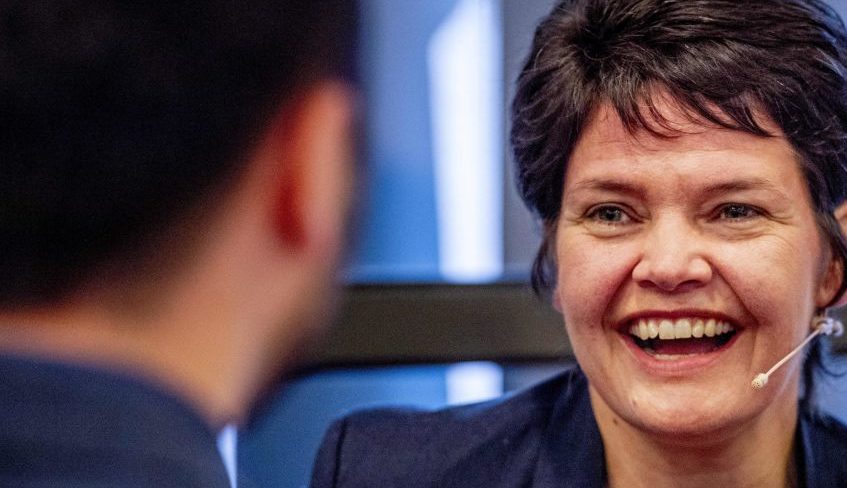
Holiday reads to challenge and inspire
From dystopian novels to a guide on public speaking, IMD professors share six of the books they have enjoyed this year....

by Natalia Olynec Published September 23, 2021 in Book Review • 4 min read
.
When it comes to thinking about sustainability, it’s easy to lose hope. Soaring carbon emissions, growing inequality, and depleting natural resources are just a few of the challenges making headlines. A recent series of sustainability books help change our perspective. They present stories of bold shifts, innovative thinking, and pragmatic action, while challenging business leaders to think differently and take steps to contribute to a brighter future. The titles provide concrete examples to move from the “why” to the “how” of sustainability, and accelerate the business transformation needed to ensure we meet our goals. With the Cop26 climate talks in Glasgow fast approaching, here we give an overview of the books we are reading at IMD as we work with senior executives to develop the leadership needed to build businesses with positive social and environmental impact.
Reviewed by Prof Michael Yaziji
Will the traditional economic thinking that brought us to our current environmental and social state be enough to get us out of it? Oxford’s Kate Raworth, pictured above, thinks not. She argues that the discipline of economics, in striving to emulate the rigor and mathematical elegance of physics, has simplified and assumed away too much realism. It is an important source of many of our social and environmental woes. She systematically undercuts these fundamental assumptions undergirding the field, from GDP as the measure of economic performance, to homo economicus. In their place she proposes a model whose sweet spot provides for social needs within the strictures of environmental sustainability.
Reviewed by Prof Michael Yaziji
The New Map is primarily backward-looking. With impressive breadth and depth, it describes the historical interplay between geopolitics and energy (in the form of oil and gas). The biggest recent shift in both has been the result of the shale revolution in oil and gas, and the geopolitical implications are intriguing. To this it dedicates 300 pages. Unfortunately, it gives short shrift, just 50 pages, to the ramifications of the dominant change driver today and for the next decades: climate. Yergin has a disappointingly narrow-minded and dismissive attitude toward environmentalists. He likely — hopefully — also underestimates the rate of change in policies, technology, and the global energy mix that are being driven by the climate imperative.
Reviewed by Prof Karl Schmedders
If you have spent only little attention to the details of global warming, then this book is a must-read. Bill Gates provides a very readable introduction to the causes of climate change. Importantly, he takes a no-nonsense look at the magnitude of greenhouse gas (GHG) emissions from various sectors in the world economy. Being an engineer at heart, he focuses on numerous technical solutions for reductions of GHG emissions. Thereby readers obtain a vivid picture of the gigantic challenge posed by global warming to humanity. Gates also calls for more government policies to encourage massive investments in technical innovation. If the book has a weakness, then it is perhaps the lack of a well-founded discussion of the critical issue of a “just transition”— that is, of the political and social challenges confronting policy makers in addressing climate change.
Reviewed by Natalia Olynec, IMD Head of Sustainability
Rebecca Henderson, a Harvard Professor, calls for business to boldly reimagine capitalism – shifting from a system solely focused on maximizing profits to one that considers corporate responsibility for mitigating climate change, preserving democracy and ensuring social justice. By providing pragmatic examples of corporates driving this change, Henderson demonstrates how this approach is both in the interest of the private sector and broader society, ensuring long term prosperity. Written before the pandemic, the book’s arguments for a systemic approach by purpose-led companies becomes even more poignant amid the current global health crisis. While optimistic, Henderson’s arguments encourage business leaders to address some of the world’s greatest challenges in collaboration with policymakers and civil society in “support of the foundations of our society”.
Join us for a live Book Club event every month. On September 23, Knut Haanaes will meet Martin Reeves for a discussion of his book, The Imagination Machine.

Chief Sustainability Officer at IMD
Natalia is the Chief Sustainability Officer at IMD. She designs and implements sustainability strategy, develops executive education programs and advisory, publishes research, builds cross-sector partnerships, and communicates IMD’s ambitions and progress. The Center for Sustainable and Inclusive Business, co-led by Olynec, aims to support leaders and companies to take steps towards a more sustainable and inclusive business world by harnessing IMD’s knowledge and expertise in this field and offering tools to help them deliver systemic, innovative, and impactful responses.

December 6, 2024 • by John R. Weeks, Susan Goldsworthy, José Parra Moyano, Katharina Lange, Howard H. Yu, Öykü Işık in Book Review
From dystopian novels to a guide on public speaking, IMD professors share six of the books they have enjoyed this year....

October 18, 2024 • by Howard H. Yu in Book Review
Howard Yu, LEGO® Professor of Management and Innovation at IMD, recommends six books that will inspire you and help maximize your talent....
 Audio available
Audio available
September 6, 2024 in Book Review
Professors at IMD recommend books exploring the world of art to help you think in more creative ways....

April 30, 2024 • by Öykü Işık in Book Review
The old-fashioned printed word offers valuable insight on the latest technology. Here is our guide....
Explore first person business intelligence from top minds curated for a global executive audience